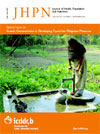
|
The Journal of Health, Population and Nutrition
icddr,b
ISSN: 1606-0997
EISSN: 1606-0997
Vol. 36, No. S1, 2017, pp. 25-34
|
 Bioline Code: hn17049
Bioline Code: hn17049
Full paper language: English
Document type: Research Article
Document available free of charge
|
|
|
The Journal of Health, Population and Nutrition, Vol. 36, No. S1, 2017, pp. 25-34
| en |
Care-seeking behaviors for maternal and newborn illnesses among self-help group households in Uttar Pradesh, India
Aruldas, Kumudha; Kant, Aastha & Mohanan, P. S.
Abstract
Background: India has made large strides in reducing maternal mortality ratio and neonatal mortality rate, yet
care-seeking behavior for appropriate care is still a challenge. We conducted a qualitative study to understand the
process of recognition and care-seeking for maternal and newborn illnesses in rural India where a health
intervention through women’s self-help groups (SHG) to improve maternal and newborn health behaviors is
implemented by a non-governmental organization, the Rajiv Gandhi Mahila Vikas Pariyojana. The study aimed to
understand the process of recognition and care-seeking for maternal and newborn illnesses from SHG and non-SHG households in the intervention area.
Methods: Thirty-two illness narratives, 16 of maternal deaths and illness and 16 of newborn illnesses and
deaths, were conducted. Women, their family members, and other caretakers who were present during the
event of illness or death were included in the interviews. About 14 key informants, mainly frontline health
workers (FLWs), were also interviewed. The interviews were conducted by two Population Council staff using
a pre-tested guideline in Hindi.
Results: Our findings suggest that perceptions of causes of illness as “supernatural” or “medical” and the
timing of onset of illness influence the pathway of care-seeking. Deep-rooted cultural beliefs and rituals
guided care-seeking behavior and restricted new mothers and newborns’ mobility for care-seeking. Though
families described experience of postpartum hemorrhage as severe, they often considered it as “normal.”
When the onset of illness was during pregnancy, care was sought from health facilities. As the step of care
for maternal illness, SHG households went to government facilities, and non-SHG households took home-based
care. Home-based care was the first step of care for newborn illnesses for both SHG and non-SHG
households; however, SHG households were prompt in seeking care outside of home, and non-SHG
households delayed seeking care until symptoms were perceived to be severe.
Conclusion: Our findings indicate that care-seeking behavior for maternal and newborn morbidities could be
improved by interventions through social platforms such as SHGs.
Keywords
Care-seeking; Maternal illness; Newborn illness; Social platform; Self-help group; Uttar Pradesh; India
|
| |
© Copyright 2017 - The Author(s)
Alternative site location: http://www.jhpn.net
|
|
